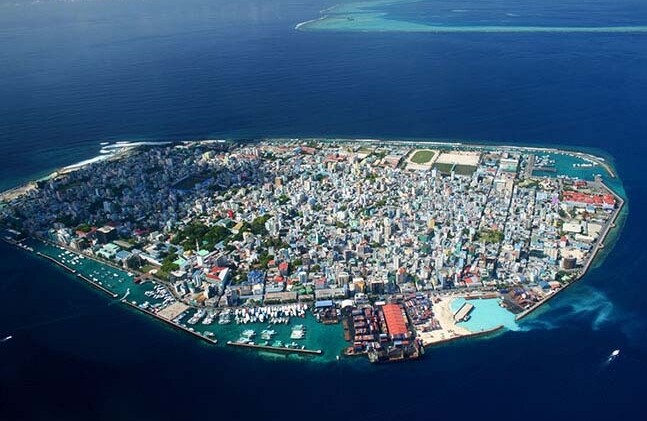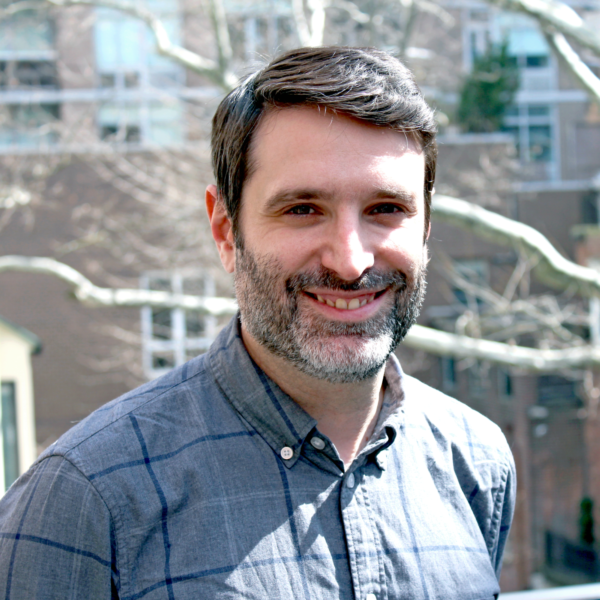Background
As The Island President makes clear, it is impossible to overstate the catastrophic effect global warming will have on the Maldives. At a press event during the 2009 Copenhagen Summit, an interviewer asked Mohamed Nasheed, the country's president and the subject of the documentary, what Plan B is for the Indian Ocean archipelago. Deadpan and without missing a beat, Nasheed answered, "None. We will all die."
Comprised of about 2,000 islands, of which around 200 are inhabited, the Maldives, with its clear seas and golden beaches, are a symbol of tropical relaxation—"a cross between paradise and paradise," says Nasheed. They are also extremely low-lying, with an average elevation of about 1.5 meters. Amazingly, there is not one hill in the entire country, and the highest point on any of the islands is under eight feet.
These facts essentially make the Maldives ground zero for climate change. The country will simply not exist for much longer if parts per million of carbon dioxide in the atmosphere continues to increase and the oceans continue to rise. Already the rising seas have harmed the nation's fishing industry and contaminated some of the Maldives' fresh groundwater, which is used as drinking water. But much more is at stake. "We're going to lose an identity, a culture," says Aminath Shauna, the president's climate coordinator. "There's so many other countries [dealing with climate change]—the Netherlands, Nigeria—but none of these countries will lose their entire national identity. We will."
Running parallel to the climate change crisis, is a political one that stretches back to at least 1978, when Maumoon Abdul Gayoom began his dictatorial reign of the Maldives, and has only become more complicated in the last year. In this story, Nasheed is, at first, the underdog, writing news articles about human rights abuses, and getting arrested and tortured multiple times during the 1990s. Finally, in the mid-2000s, after a young prisoner was beaten to death in a Maldives jail and the 2004 tsunami wiped out 50 percent of the nation's GDP, the opposition started to make inroads. Nasheed went abroad, organized an opposition party, returned home to a hero's welcome, and civil disobedience spread. In 2008, the Maldives finally held free elections and Nasheed was elected president. Controversy again erupted in 2011 when tensions over Islamic and economic issues and the unlawful detention of a judge forced Nasheed from the president's office and back in jail (more on this later). But for a couple of years, Nasheed's earnestness and determination combined with the obvious desperation of his nation was the perfect narrative for the grassroots sustainability movement.
This is all portrayed to great effect in the film. With Nasheed as the main character and build-up to the Copenhagen Summit providing a natural story arc, the film plays out almost more like a feature film than a documentary. As such, it is easy to become emotionally invested in Nasheed and his advisers and their near-impossible mission to halt climate change. With the gorgeous Maldives as a backdrop, the film is also visually stunning. Despite the nation's horrific past and uncertain future, you can't help but wish you were on the beach along with Nasheed and his associates.
And while it is clear that Nasheed is the protagonist of this story, the filmmakers do not spend much time antagonizing the other side. When Nasheed is challenged on issues like international monitoring and carbon emissions in the developing world, his adversaries are not presented as inhuman monsters—they are looking out for their constituents and want to be treated fairly. They may be on the wrong side of the debate and it is tempting to focus on negativity when it comes to climate change, but the film, taking its cue from Nasheed's naturally upbeat disposition, stays positive and keeps the focus on the Maldives.
To this end, The Island President showcases two different strategies that Nasheed utilizes in tackling climate change and attracting the attention of the sustainability community. First, he is not afraid of self-promotion, publicity, and blunt/hyperbolic statements to get his message to the world. And, second, he is also a pragmatist, painfully aware of the bleak outlook for his nation, the effect he and his tiny country have on people, the complicated negotiating process connected to a global climate deal, and the dueling motivations of the developed and developing nations when it comes to carbon dioxide emissions.
The Rhetoric of Climate Change
Nasheed knows the power of a good sound-bite and he employs this to full effect in the lead-up to the Copenhagen Summit. At every opportunity, he points out that for the Maldives, climate change is a life-or-death situation. As he puts it, "Survival is non-negotiable" or "At least we can die knowing we did the right thing." He berates the United Nations General Assembly, telling them, "You're really not listening" and later wonders why the UN has failed to act. "The role of the UN has never been so clear," he says.
Nasheed also understands that the Maldives' status as a small nation (population ~ 320,000; roughly the size of St. Louis) means two different things. First, people probably don't know much about the nation and its plight, hence the brutally honest/exaggerated statements to get people listening. A British adviser warns against the comparisons, but Nasheed has no qualms about invoking Nazis and communists in a talk at England's Oxford University. "Maldives is a frontline state," Nasheed says. "If you thought defending Poland and defending Vietnam was important, defending the Maldives is very important." Predictably, the headlines in the Times of London the next day read: "Global Warming like Nazi Invasion."
Nasheed also understands that symbols can be effective in his struggle. To this end, he shoots a commercial calling for climate change action while standing in the Indian Ocean in a business suit. He also holds an underwater cabinet meeting as he and his ministers don scuba gear and sit on chairs at the bottom of the sea.
The Politics of Climate Change
After the commercials, photo shoots, and pithy quotes, however, comes the actual business of climate change negotiations. Ahead of Copenhagen, the movie shows a tense meeting between Nasheed and his cabinet and the Indian government that previewed one of the major moral arguments in this debate: Are developing nations willing to curb their industrialization efforts for the greater good? An Indian official made the oft-repeated point that it is hypocritical for Western governments, who are mostly responsible for the current climate crisis, to ask the countries like his to reign in their emissions. The Maldives environmental minister Mohamed Aslam is the most vocal about this worrying state of affairs. "I don't even like the term negotiation when we have to deal with climate change," says Aslam, "because there really is nothing to negotiate when it comes to climate."
In Copenhagen, it is more of the same. China objects to language in a conference document that would change the acceptable limit of worldwide temperature change from 2 degrees to 1.5 degrees Celsius. The Chinese also are against international monitoring of their emissions, arguing that it compromises their sovereignty. "It's simply madness of China and India not to take it up," says Nasheed at one point. "Just because the West has pumped so much poisonous gas into the atmosphere, that doesn't mean we have to do it again."
Eventually, though, Nasheed realizes that he will have to compromise with India and China to get anything accomplished in Copenhagen. He even agrees to be a "puppet" of China and stands silently during a meeting/photo op with Chinese Premier Wen Jiabao. Some of Nasheed's advisers and ministers are aghast at the president's new strategy. Aslam is the most vocal, arguing, "All we have is our moral grounds. We should not compromise our moral grounds." But Nasheed, the pragmatist, is not swayed. He does not want to leave Copenhagen empty-handed and an agreement is signed.
An Uncertain Aftermath
Nasheed left Copenhagen with the Danish prime minister calling him a "hero," but the victory was mixed and short-lived. The agreement that came out of the conference calls for reduction of carbon dioxide emissions, but it doesn't require it and some important scientific language was, indeed, left out. As the postscript of the film states, the percentage of greenhouse gases in the atmosphere continues to rise. Thus, the biological fate of the Maldives remains extremely grim, just as it was before Nasheed took office. Those closest to Nasheed understand that the battle is far from over and it may ultimately be unwinnable. While beautiful footage of the Maldives' dazzling scenery flashes by and the Nasheed family plays in the surf as the film winds down, the president's wife intones, "I sometimes wish I had not children."
Post-Script
For Nasheed, personally, the future is similarly bleak. In May 2011, protests erupted in the Maldives that would eventually lead to the president's demise. Occurring during the Arab Spring, some of the opposition forces were led by Gayoom loyalists, but others demonstrated against rising commodity prices and the allowance of pork and alcohol in some resorts in the Maldives, which requires adherence to Islam by law.
As the protests continued, Nasheed un-constitutionally arrested a judge who sympathized with the protestors. This ignited further protests and Nasheed finally resigned from his post in February 2012. He called this episode a coup, saying he was forced out under physical duress, but the Maldives' National Commission of Inquiry found no evidence to support this. The United States and the British Commonwealth agreed with the commission's findings. Nasheed was later arrested in October 2012 after violating a court order not to leave Maldives' capital city of Malé. He was detained again in March 2013 for failing to appear in court in the previous month. As of June 2013, Nasheed was campaigning ahead of the September presidential elections in the Maldives and the status of his legal problems is uncertain.
Ethical Issues and Discussion Questions
1. Were Nasheed's publicity stunts—the photo shoot in the ocean, the underwater cabinet meeting—useful for the climate change debate? Did they take away from the issues? 2. Was Nasheed's use of brutal honesty/exaggeration when dealing with the press an effective strategy? 3. Was Nasheed right to compromise with India, China, etc. on the negotiations in Copenhagen? Should he have listened to Aslam and taken a harder line? 4. What more can the UN do about climate change? 5. Is it hypocritical of the United States and other advanced economies to ask developing nations to curb their greenhouse gas emissions? 6. Is China right when it says that international monitoring of carbon dioxide emissions is an attack on its sovereignty?
Selected Carnegie Council Resources
Ethics Matter: Environmentalist Bill McKibben on Climate Change Bill McKibben, 350.org It's wrong to say Americans are addicted to fossil fuel. The addicts are oil and gas company executives, who won't give up their profits. Until we put a price on carbon that reflects the damage it does in the atmosphere, we'll continue to have this catastrophic market failure and moral failure. (Ethics Matter, October 2012)
Garrett Cullity on Climate Change Garrett Cullity, University of Adelaide Since there is very little any given individual can do to address climate change, there is a problem drawing a line from collective responsibility to individual responsibility. Fortunately, philosopher Garrett Cullity has a solution for morally motivating individuals. (Public Ethics Radio, July 2012)
What I Talk About When I Talk About Sustainability Josh Lasky, College of Agriculture, Urban Sustainability and Environmental Sciences, University of the District of Columbia The ease with which sustainability rolls off the tongue these days far surpasses our understanding of it or our implementation. A few changes in attitude could be helpful. (Policy Innovations article, February 2013)
Climate Justice and Capabilities: A Framework for Adaptation Policy David Schlosberg, University of SydneyMost well-known approaches to climate justice have two important weaknesses, in that they fail to take advantage of two crucial developments: one, the identification of social and political misrecognition as the key underlying condition of the maldistribution of goods and risks; and two, the influential capabilities approach, which focuses on the specific range of basic needs and capabilities that human beings require to function. (Ethics & International Affairs article, Winter 2012)
Ethics, International Relations, and Global Environmental Governance Lorraine Elliott, The Australian National University; See Seng Tan, Centre for Multilateralism Studies, S. Rajaratnam School of International Studies, Nanyang Technological University, Singapore Lorraine Elliott's recent lecture in Singapore drew on more than a decade of work to canvass ways in which we might understand—and indeed make sense of—the links between ethics and global justice, key organizing principles in international relations, and a critical-practical politics of global environmental governance. (Report on lecture given in Singapore, November 2012)
Principle vs. Practicality: A Closer Look at the Ethics of Climate Change Adaptation Finance Leif Wenar, Centre for Medical Law and Ethics, School of Law, King's College London Mixing the principles of causality, vulnerability, and ability to pay into the negotiations over climate change adaptation is unnecessarily complicated. There are moral and political reasons to opt for a simpler approach. (Policy Innovations article, June 2012)
Global Ethics Corner: When Your Island Sinks By 2050 some estimate that climate change will displace 150 million people, but the displaced won't qualify as refugees under international law. What should be done about relocation? (Global Ethics Corner, June 2009)
The Right to Relocation: Disappearing Island Nations and Common Ownership of the Earth Mathias Risse, John F. Kennedy School of Government, Harvard University Risse is concerned with humanity's common ownership of the earth, which has implications for a range of global problems. In particular, it helps illuminate the moral claims to international aid of small island nations whose existence is threatened by global climate change—such as Kiribati. (Ethics & International Affairs article, Fall 2009)


